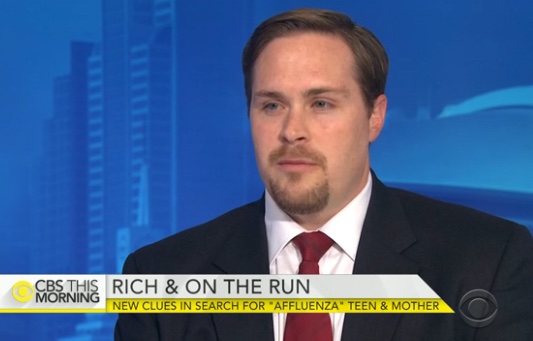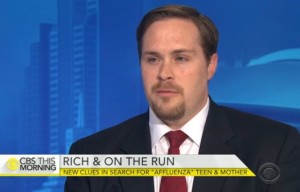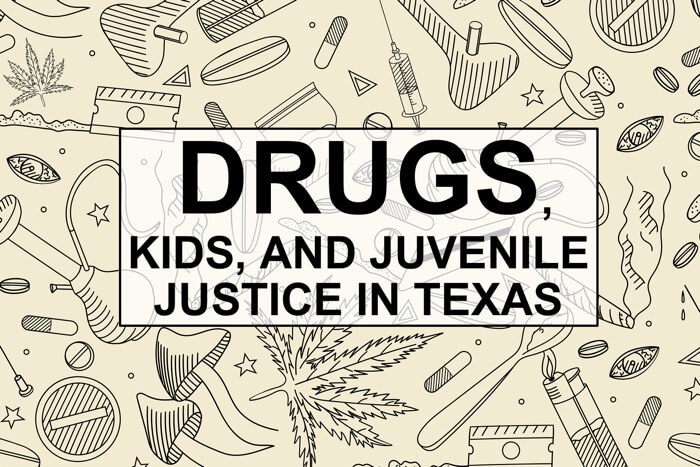
What Every Parent Needs to Know About Drug Crimes and the Juvenile Justice Process
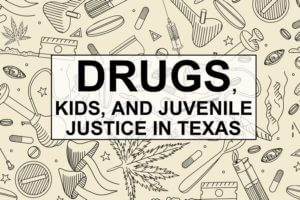 One of the most common way for teenagers to run afoul of the law is with drugs. Between peer pressure, synthetic drugs, and confusion over possession vs. ownership, there are many pitfalls surrounding the topic of drugs for kids. Many times, parents aren’t even aware their child has been exposed to drugs until that child is in trouble. Here are some basic things that every parents needs to know about kids and drugs before it’s too late.
One of the most common way for teenagers to run afoul of the law is with drugs. Between peer pressure, synthetic drugs, and confusion over possession vs. ownership, there are many pitfalls surrounding the topic of drugs for kids. Many times, parents aren’t even aware their child has been exposed to drugs until that child is in trouble. Here are some basic things that every parents needs to know about kids and drugs before it’s too late.
Levels of Drug Offenses and Ranges of Punishment in Texas
In Texas, criminal offenses are divided into two major categories: Felonies and Misdemeanors, with felonies being the more serious. Except for possession of small amounts of marijuana or prescription drugs, all other drug offenses in Texas are felonies. This means that this is a very big deal if your child is arrested for drugs.
In the juvenile system, the punishment for misdemeanors ranges from nothing up to probation until that child’s 18th birthday. This probation can be served out at home. However, if appropriate, the court can order the child to a treatment facility, boys’ ranch, or some other kind of placement as part of the probation.
The punishment options for felonies in the juvenile system, like for misdemeanors, include doing nothing and probation up to a child’s 18th birthday (with or without placement outside of the home). For felonies, however, the court also can commit a child to the Texas Juvenile Justice Department (TJJD), which is the prison system in Texas for kids. A commitment to TJJD can last up until a child’s 19th birthday.
Synthetic Drugs – A Moving Target
Some of the most popular drugs in use today are synthetic or designer drugs. They go by a variety of nicknames including K2, bath salts, and Spice. These particular drugs are especially dangerous for a number of reasons. First, because they are a chemically altered variation of an illegal drug, they are legal in many cases. The legislature is still struggling to write the laws in such a way to criminalize all of these variations. As they make one chemical formula illegal, the chemists making these drugs alter it to escape prosecution. The law is making headway in this field, but it is a slow process. Because of this loophole, many of these synthetic drugs are legally sold in stores and over the internet. This makes it very easy for kids to get their hands on them.
The second reason why these drugs are particularly dangerous is because there is no way for a user to know what exactly is in the dose they are taking due to the rapidly changing chemical alterations that are being made to stay ahead of the law. The K2 your child takes today may be drastically different from the dose he took last week. There is also no way to know what side effects a specific chemical combination will have on a particular person or even the human body generally.
Part of the reason why these drugs are so popular with kids is because it is almost impossible to detect them. Because of the quickly changing chemical makeups of these drugs, it’s difficult to develop a drug test that can detect them all. Additionally, most parents have never heard of these drugs, which makes it easier for kids to get away with using them without their parents realizing what they are doing. This difficulty in detecting these drugs makes it more likely for kids to abuse these particular substances.
Prescription Drugs
Another category of drugs that has risen in popularity with teenagers is prescription drugs. These are used frequently by kids because they are easy to get their hands on. All they have to do is to go to the medicine cabinet at home and help themselves to whatever drugs are on the shelf. It doesn’t matter what the prescription is for or who it belongs to, it can be abused by kids. Teens have been known to sell and/or use pills prescribed for everything from ADD to depression to high blood pressure. When parents are unaware of the potential for kids to take these medicines, they are unlikely to secure them in order to keep them away from their teenagers. There have been several cases recently in Tarrant County where kids have been arrested at school for illegally selling or possessing a prescription drug that they took from their parents.
Ownership vs. Possession
When it comes to the drug laws, many kids are confused about the difference between ownership vs. possession. The law makes it illegal to possess drugs, regardless of who owns them. In fact, because drugs are considered “contraband,” the law doesn’t consider anyone to “own” them. Many kids, when busted for possessing drugs, will say, “But it’s not mine. I was just holding it for my friend.” They don’t understand that this means they are breaking the law, not their friend. Possession is defined as having care, custody, and control of something. This means that if you have the drugs in your pocket, you are in possession of them whether you “own” them or not.
Many “good kids” who wouldn’t dream of committing a crime will get caught holding drugs for their friends. Because they don’t understand that, if caught, they will be the guilty party and not their friend, they agree to hold onto the drugs for their buddy. It’s important that parents talk to their kids and explain this aspect of the law and the effect it can have.
Common Situations Where Kids Encounter Drugs
As I said at the beginning, drugs are a common reason why kids find themselves in the juvenile justice system and in alternative school for a period of time. It is a slippery slope that many teenagers find themselves on before they even realize what has happened. Below are some of the most common places for kids to encounter drugs.
1. School
Our kids spend a good deal of their time at school. By the time a kid gets into middle school and high school, a big chunk of their social circle is centered around school. School is also the place where they are likely to encounter a wide variety of different people. So, it’s no wonder, that it is also the place where many kids first encounter drugs. Not only do the school administrators and teachers have to be on the alert for drugs in school, but parents also need to be aware and be proactive in preparing kids to walk away when they encounter drug activity in the school environment.
2. Friends
When kids are in their preteen and teenage years, peer pressure is a very powerful force. Many kids are first exposed to drugs by their friends. Therefore, it is important, as parents, to know our kids’ friends and to be around them enough to pick up on whether these friends have a problem with drugs before our kids follow the same path. It’s also important for parents to consistently work on having that open communication with their kids so that, when the time comes, your kids can feel comfortable coming to talk to you about drugs and friends. Kids also need to know that if they are ever asked to hold onto to drugs for their friends, that they must say no, even if it means losing a friend over it.
3. Cars
Cars present a tricky scenario for kids when it comes to drugs. If your teen gets into the car with someone who has drugs, it is very possible that your child will get charged with the drugs if they are pulled over by police. When police and prosecutors are looking at who within a car to charge with possession of the drugs, they will many times look to the person who was sitting the closest to the drugs. If someone else in the car drops their stash of drugs near your child, then it may appear that your child was the one in possession.
This is a situation where parents need to talk to their children about how easy it is for them to be in a car with others and be held responsible for the actions of those other people. Kids need to be very careful about who they get into a car with. Parents need to prepare their kids to make the right decision when confronted with whether to get in a car with someone or not.
Conclusion
While it is common for otherwise “good kids” to get in trouble with the law when it comes to drugs, it is not inevitable. If parents take the time to educate themselves and their kids about the pitfalls that drugs can create, they can help their teenagers to avoid getting involved in the juvenile justice system.
About the Author
Christy Dunn is a writer and attorney licensed to practice in Texas. She was a prosecutor for 15 years. The last five years of her prosecutorial career was spent in the Juvenile Division of the Tarrant County District Attorney’s Office. She has tried over 20 juvenile cases in Texas and multiple certification hearings. She was part of the multidisciplinary team that created a Project SAFeR.

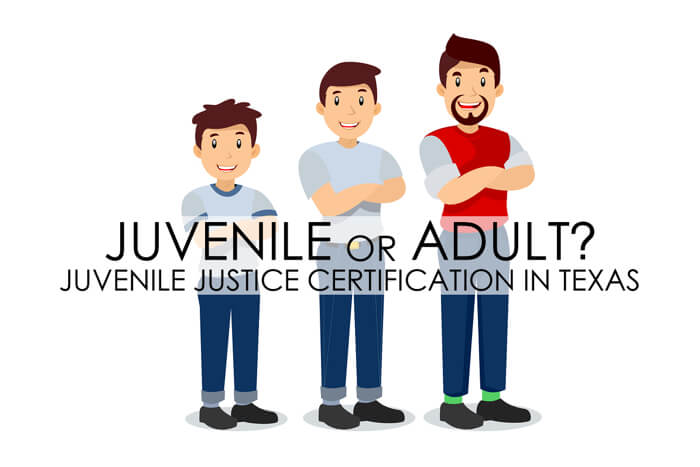
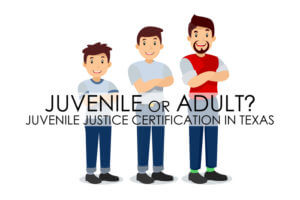 The juvenile court has exclusive jurisdiction over offenses committed by juveniles (children ages 10-17) in Texas. The only exception to this, according to Texas Family Code Section 54.02, is when the court waives its jurisdiction and transfers a juvenile to an adult district court to face the adult criminal justice process. This is what is called certifying a juvenile as an adult. The Family Code lays out a process for when and how a juvenile may be certified.
The juvenile court has exclusive jurisdiction over offenses committed by juveniles (children ages 10-17) in Texas. The only exception to this, according to Texas Family Code Section 54.02, is when the court waives its jurisdiction and transfers a juvenile to an adult district court to face the adult criminal justice process. This is what is called certifying a juvenile as an adult. The Family Code lays out a process for when and how a juvenile may be certified.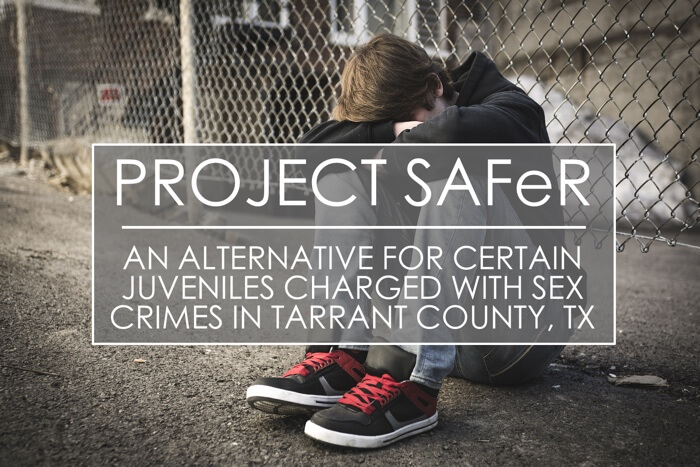
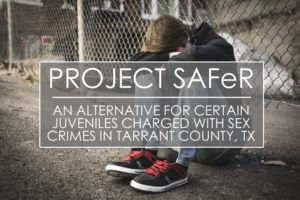 Imagine this: You receive a call out of the blue from a detective telling you that he is investigating your 11-year-old son for sexually touching your 6-year-old niece. How do you protect your young son who is being charged with Aggravated Sexual Assault of a Child? How do you choose between helping your son and helping your niece? Is there any way to get them both help without prosecuting your son? Will your son be labeled a sex offender for the rest of his life? Is there any way for your extended family to work this out?
Imagine this: You receive a call out of the blue from a detective telling you that he is investigating your 11-year-old son for sexually touching your 6-year-old niece. How do you protect your young son who is being charged with Aggravated Sexual Assault of a Child? How do you choose between helping your son and helping your niece? Is there any way to get them both help without prosecuting your son? Will your son be labeled a sex offender for the rest of his life? Is there any way for your extended family to work this out?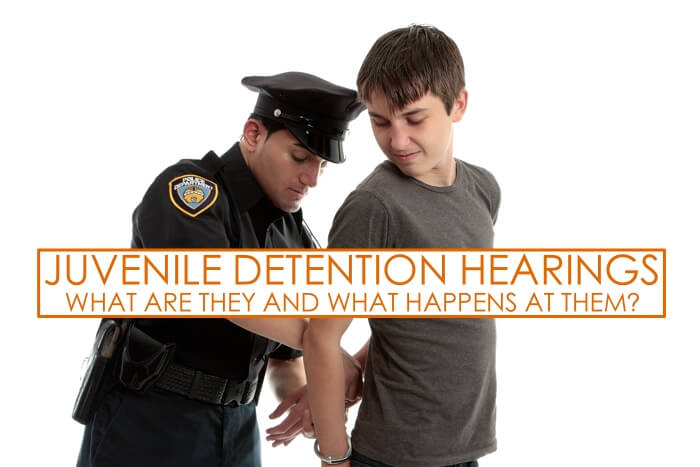
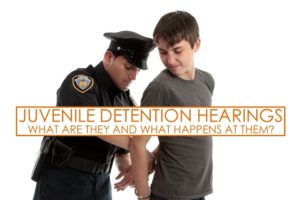 If a juvenile (a child between the ages of 10-16) is arrested, that person is taken to a juvenile detention center instead of jail. In the juvenile justice system, there is no such thing as bail. There is no amount of money a parent can pay to get their child out of detention. Instead, a detention hearing will be held. This article will explain what detention hearings are, why you need an attorney, and what happens during those hearings.
If a juvenile (a child between the ages of 10-16) is arrested, that person is taken to a juvenile detention center instead of jail. In the juvenile justice system, there is no such thing as bail. There is no amount of money a parent can pay to get their child out of detention. Instead, a detention hearing will be held. This article will explain what detention hearings are, why you need an attorney, and what happens during those hearings.